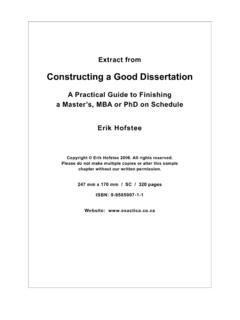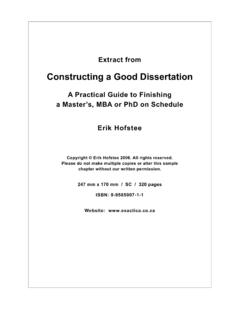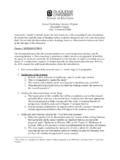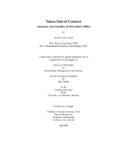Transcription of Constructing a Good Dissertation - Introduction
1 Extract from Constructing a good Dissertation A Practical Guide to Finishing a Master's, MBA or PhD on Schedule Erik Hofstee Copyright Erik Hofstee 2006. All rights reserved. Please do not make multiple copies or alter this sample chapter without our written permission. 247 mm x 170 mm / SC / 320 pages ISBN: 0-9585007-1-1. Website: Begin with the end in mind. Steven Covey Introduction . Nervous? The good news is that writing a passing Dissertation is not about earthshaking research, perfection or any other unattainable goals. It's about completing a good research-based work and presenting it in a well-structured and well-written manner in a reasonable amount of time.
2 The Dissertation is an accreditation process to prove to your university that you can do it. Victory is walking out with your degree in your hand. But the Dissertation poses a major problem for many postgraduate students. It is a large source of attrition in postgraduate programmes, so much so that the ABD stage All But Dissertation is also popularly known as All But Dead. The problem is, you are no longer just required to show that you understand academic work, you are required to actually do it. You are expected to produce the biggest and most significant work of your academic career. And what's more, you're expected to do it more or less alone! It's no wonder if you feel that you've been thrown in the deep end.
3 Many Dissertation writers feel that way. Writing a good Dissertation need not be such a hurdle. Dissertation writing is a skill that can be learned. Like writing poetry, music or a short story, it has rules. Doing it well takes both creativity and an understanding of the craft. What makes it seem so difficult is that, as the quote in the front of this book points out, many professions can be seen as a conspiracy against the uninitiated. A secret language, understood only by initiates, is essential to any good conspiracy. Academics is no exception. In order to write a good Dissertation , you need to get past the jargon to the sense. Crack the code, and the formulating, researching, structuring and writing of the Dissertation all become much simpler.
4 When you understand the underlying logic, creating a good Dissertation is not rocket science. What you put into the Dissertation may be rocket science, but the actual skills needed to research, structure and write the work are not. But you must start with a firm goal the end in mind. GOALS. Dissertations are written in order to demonstrate competence to examiners so that they may, in good conscience, award you the degree that you enrolled for. Given that truth, in order to maximise your chances of getting the degree, your primary goal should not be making the major contribution to your field; it should not be to dazzle the people in your department with your brilliance it should be to hand in a solid work in a reasonable amount of time.
5 Xvii Introduction . If the hard truth be told, very few people will ever read your Dissertation . Millions of master's and doctoral dissertations have been written over the years, but very, very few have become anything approaching bestsellers, or redefined how we look at the world. Yours is unlikely to be an exception. This does not mean you can't do your Dissertation on something you enjoy, or that you should not to try push the boundaries of knowledge, but it does mean that practicality should be your prime motivator. If anything contradicts your goal of finishing a good Dissertation on time, the underlying assumption in this book is that you'll choose to do what is needed to finish a good Dissertation and leave the contradictory objectives for other times and occasions.
6 This is not quite as harsh as it sounds: You're doing the Dissertation for a reason and chances are, whatever that reason is, you'll be taken a lot more seriously once you have your degree. Even if you plan to stay in academics, it is best to see your Dissertation as an exercise and as the basis for later publications, which will be read. The moral: Don't try to solve the world's problems in your Dissertation , even if you really care about them do that later. By all means, lay the foundation in your Dissertation , but don't compromise your primary goal of finishing and passing on schedule. Too many people who start postgraduate programmes don't finish them for you to consider taking that chance.
7 Three factors are predictive of whether or not you will complete your Dissertation : The first is your goal. If you make it your stated goal to finish a good Dissertation on time and focus your activities on that, you will finish. If you compromise that goal well, you might get lucky anyway. Second is your process. You need to know what to do, how to do it, and when to do it. Explaining that is the purpose of this book. If you follow the steps suggested, you will make steady progress towards your goal. The third factor is, quite simply, your discipline. Researching and writing a Dissertation is a lot of work, and it needs to be done. There are shortcuts . efficient ways of going about it but it will still take many, many hours.
8 Putting them in will take self-discipline. If all three factors are in order, the chances are excellent that you will finish your Dissertation in good time and with a positive result. Planned properly, writing a Dissertation can actually be a fun and rewarding process. Nowhere else in your degree programme do you have as much freedom to express yourself, your ideas and interests. Nowhere else do you get to be as creative. There are many ways of writing a Dissertation , but the classic academic method is nearly always the best and most certain way of fulfilling the requirements for a good Dissertation . When applied to a clear problem about which the researcher has xviii Introduction developed a good thesis, it provides a framework that leads to reliable conclusions while making sure that all the necessary components are where they belong.
9 THE Dissertation . Both the word Dissertation ' and the word thesis' are commonly used to refer to the document that you need to hand in to complete your master's or doctoral degree. Strictly speaking, a thesis' is a hypothesis, an unproven statement about something, whereas the dictionary definition of a Dissertation ' is A treatise advancing a new point of view resulting from research; usually a requirement for an advanced academic degree (Anthony Lewis, WordWeb Dictionary. Princeton University, 2004). This book refers to both a master's Dissertation and a PhD thesis as a Dissertation '. Centuries ago, John Locke observed that Certain subjects yield a general power that may be applied in any direction and should be studied by all.
10 Writing a Dissertation is one such. Done properly, it will teach you to focus, to structure, to write and to argue. It will teach you how to evaluate the arguments of others and use them along with your evidence to come to a well-balanced conclusion. And it will lead to a formal qualification that will set you apart from most other people, enhancing your prospects wherever you choose to apply your newly developed power. Typically, for a master's degree you will be expected to produce a Dissertation of 100-120 double-spaced pages and, for a PhD, roughly 220 pages. For a mini- Dissertation (also known as a research report'), an option in some master's degree programmes, you will be expected to produce anything from 40-60 pages.










